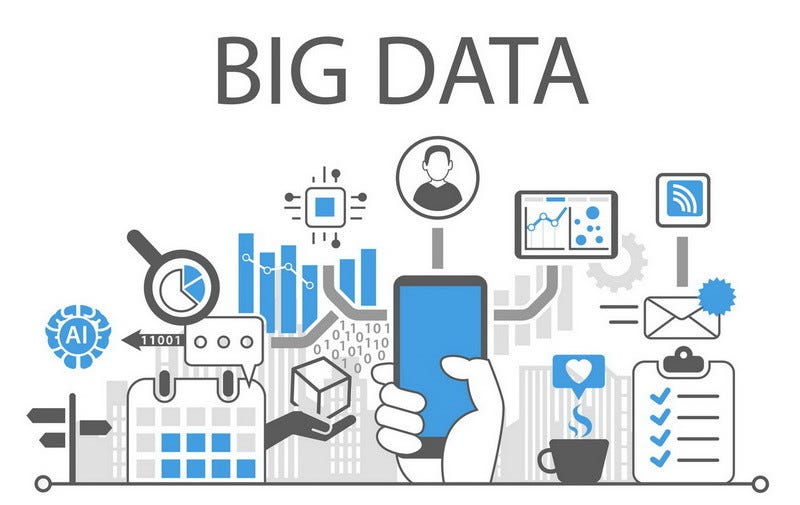Introduction
Big Data refers to the massive amounts of structured, semi-structured, and unstructured data that is generated by businesses, governments, and individuals every day. The proliferation of digital devices, sensors, and online services has made it possible to collect, store, and analyze this data, providing businesses with valuable insights into customer behavior, market trends, and operational inefficiencies. In this article, we will explore the concept of Big Data, its benefits and challenges, and some of the technologies and techniques that are used to manage and analyze it.
What is Big Data?
Big Data refers to datasets that are too large, complex, or dynamic to be processed by traditional data processing systems. It can be characterized by the 3 Vs - Volume, Velocity, and Variety. Volume refers to the sheer size of the data, which can range from terabytes to exabytes or more. Velocity refers to the speed at which the data is generated, collected, and processed, which can range from real-time to batch processing. Variety refers to the diversity of the data, which can include structured data like sales transactions, semi-structured data like social media posts, and unstructured data like images and videos.
Big Data can be generated from a variety of sources, including:
1. Social media: Social media platforms like Facebook, Twitter, and Instagram generate massive amounts of data in the form of posts, comments, likes, and shares.
2. IoT devices: Internet of Things (IoT) devices like sensors and wearables generate data on everything from environmental conditions to human behavior.
3. E-commerce: Online shopping generates data on customer behavior, preferences, and purchasing patterns.
4. Financial transactions: Banking and financial transactions generate data on customer transactions, fraud, and risk management.
Benefits of Big Data
Big Data can provide numerous benefits to businesses, governments, and
individuals, including:
2. Personalization: Big Data can enable businesses to personalize their products and services based on individual customer preferences and behaviors.
3. Cost savings: Big Data can help businesses identify inefficiencies in their operations, enabling them to reduce costs and improve profitability.
4. Improved customer experience: Big Data can enable businesses to understand their customers better, enabling them to provide more personalized and relevant experiences.
Challenges of Big Data
While Big Data offers numerous benefits, it also presents several challenges, including:
1. Data quality: Big Data is often characterized by its variety and velocity, which can make it difficult to ensure data quality. Poor data quality can lead to inaccurate insights and decisions.
2. Security and privacy: Big Data often contains sensitive information, including personal data, financial data, and intellectual property. Managing and securing this data is a major challenge, requiring robust security measures, data governance policies, and compliance with regulations like GDPR and CCPA.
3. Data integration: Big Data is often stored in multiple systems and formats, making it difficult to integrate and analyze. Ensuring data consistency and accuracy across multiple systems requires sophisticated integration technologies and techniques.
4. Skills gap: Managing and analyzing Big Data requires a range of skills, including data science, machine learning, and data engineering. Finding and hiring skilled professionals in these areas can be a challenge for businesses.
Technologies and techniques for managing Big Data
1. Data storage: Big Data requires massive amounts of storage space, typically in the form of distributed file systems like Hadoop Distributed File System (HDFS) and cloud-based storage platforms like Amazon S3 and Microsoft Azure Blob Storage.
2. Data processing: Big Data requires specialized processing techniques,
including batch processing, stream processing, and real-time processing.
Technologies like Apache Spark, Apache Flink, and Apache Kafka are commonly
used for these tasks.
4. Data visualization: Data visualization tools like Tableau, Power BI, and QlikView are used to create interactive dashboards and reports that enable users to explore and analyze Big Data in a more intuitive way.
5. Machine learning: Machine learning algorithms are used to analyze Big Data and uncover patterns, trends, and insights. Popular machine learning platforms include TensorFlow, Keras, and Scikit-Learn.
Conclusion
In addition, the ethical considerations related to the collection and use of Big Data are becoming increasingly important. As the amount of data collected continues to grow, it is important for businesses to ensure that they are collecting and using data in a responsible and ethical manner. This includes ensuring that data is collected with proper consent, protecting the privacy of individuals, and being transparent about how data is used.
In conclusion, Big Data offers significant benefits to businesses,
governments, and individuals, but also presents significant challenges that
must be addressed. Effective management and analysis of Big Data requires a
range of specialized technologies and techniques, as well as skilled
professionals with expertise in data science, machine learning, and data
engineering. As the amount of data generated continues to grow, businesses that
are able to effectively manage and analyze Big Data will have a significant
advantage over their competitors, while also ensuring that data is collected
and used in a responsible and ethical manner.




0 Comments